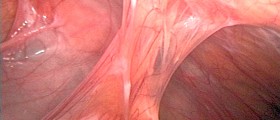
Pelvic organ prolapse actually means that organs in the pelvic cavity drop lower into the pelvis and push against the vagina. It can happen after childbirth, but also after certain kinds of surgery. Organs that can be affected by pelvic organ prolapse are the bladder (this is most frequent), the urethra, the uterus, and the small bowel. It is even possible for the rectum and vagina to prolapse. Symptoms of pelvic organ prolapse include feeling something, actually other organs, pushing against the wall of your vagina. This is a common symptom, and will be clearly experienced by a heavy feeling in your vagina. You may even feel like something will fall out of your vagina!
Having a full sensation in the pelvis and feel stretching or pulling can also be a symptom of pelvic organ prolapse. Female incontinence and problems with bowel movements, as well as pain during sex, are also related to pelvic organ prolapse after childbirth. Pelvic organ prolapse during the postpartum period may heal on its own, or with the help of simple adjustments like Kegel exercises, a healthy diet, and avoiding heavy lifting. In other cases, your doctor may recommend placing a pessary to treat your pelvic organ prolapse. Surgery may be required for women who have a more serious case of pelvic organ prolapse that did not heal on its own or with the aid of less invasive treatments.
- www.womenshealth.gov/a-z-topics/pelvic-organ-prolapse
- www.nhs.uk/conditions/pelvic-organ-prolapse/
- Photo courtesy of Mikael Haggstrom by Wikimedia Commons: commons.wikimedia.org/wiki/File:Pelvis_with_reduced_tan_lines.png

















Your thoughts on this
Loading...